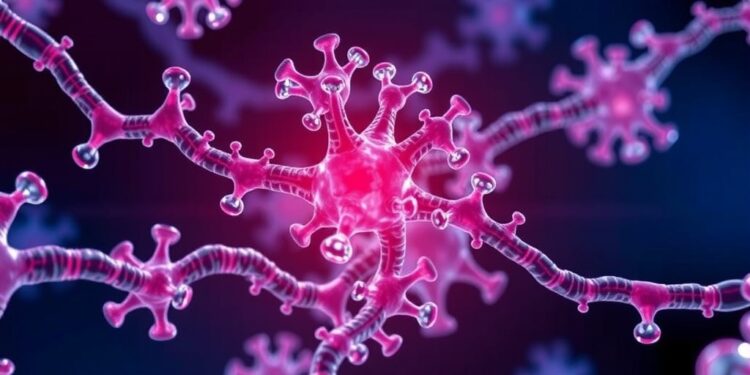New research from the University of Colorado Boulder has unveiled critical insights into the role of CDK7, a cyclin-dependent kinase that functions as a master regulator of cell proliferation. Published in the esteemed journal Science Advances, this groundbreaking study illuminates the mechanisms through which CDK7 influences the intricate process of cell division and growth, shedding light on its potential as a therapeutic target in cancer treatment.
For years, cancer researchers have recognized CDK7’s essential role within the cellular machinery that dictates when and how cells divide. Under normal circumstances, this enzyme activates other kinases such as CDKs 1, 2, 4, and 6, which are pivotal players in the orchestrated sequence of events leading to cell division. However, under pathological conditions, such as in aggressive forms of cancer, CDK7 is often manipulated to promote uncontrolled cell growth. This duality of function highlights the enzyme’s significance and complexity within oncological research.
The study, spearheaded by professor Dylan Taatjes, along with a multidisciplinary team, sought to elucidate the specific pathways influenced by CDK7. By employing a CDK7 inhibitor that has already been utilized in clinical trials, the researchers aimed to observe the immediate effects of inhibiting this enzyme on human cancerous tissue cells. Their findings revealed that in a matter of minutes, the inhibition of CDK7 led to the rapid shutdown of a core set of transcription factors fundamental to the gene expression networks that drive cell proliferation.
Transcription factors, the proteins responsible for regulating gene expression, are critical to numerous cellular processes, including differentiation, development, and the response to external stimuli. Within this study, the researchers discovered that when CDK7 activity was impeded, it resulted in the simultaneous silencing of transcription factors known to be involved in oncogenesis. This phenomenon was consistently observed across a diverse range of human cancer cell lines, encompassing 79 distinct lines from 27 different tissue types, indicating that the effects observed may transcend specific cancer types and suggest a universal mechanism at play.
Taatjes likened the influence of CDK7 on cell proliferation to a master switch that, when flipped, can halt cell growth in its tracks. This analogical description underscores the urgency and importance of further exploring CDK7’s biochemical pathways. The implications of this research extend beyond simply understanding cancer cell dynamics; optimizing therapeutic interventions aimed at CDK7 could hold promise for more effective cancer treatments with minimized side effects.
One of the most striking revelations from the study was the role of the retinoblastoma protein 1 (RB1) in mediating the effects of CDK7 inhibition. RB1 is a well-established tumor suppressor gene, one that most malignancies attempt to downregulate or evade. The researchers found that upon CDK7 inhibition, RB1’s functional capability to suppress tumor growth was potentially enhanced. This insight opens new avenues for targeting RB1 through CDK7 modulation, suggesting that synaptic interplay between the two proteins could be exploited for therapeutic purposes.
Additionally, the study’s results indicated a slower secondary effect of CDK7 inhibition on the initiation of cell division through other kinase activation pathways. This nuanced understanding of CDK7’s role in cellular proliferation provides a more granular view of how this enzyme can be selectively targeted to mitigate its disease-promoting functions while preserving essential cellular activities necessary for normal physiological processes.
The potential to develop therapies that focus on the selective inhibition of CDK7 offers a hopeful scenario in the landscape of cancer treatment. Instead of broadly disrupting all functions of CDK7, which could result in severe side effects, finely tuned approaches aimed at the transcriptional control aspects of the enzyme could lead to targeted and effective treatment alternatives for patients suffering from cancer.
These findings not only advance the scientific community’s comprehension of tumor biology but also underline the necessity of collaborative research across various domains of molecular and cell biology. The integration of computational techniques and experimental methods within this study exemplifies how multidisciplinary approaches can unravel the complexities of cellular mechanisms underlying cancer.
As researchers continue to delve deeper into the functionality of CDK7 and its interaction with various transcription factors, the hope is to optimize its inhibition into a more precise therapeutic strategy. The quest to create drugs that will effectively curb proliferative signals in cancer cells while safeguarding normal cellular functions is an ongoing challenge in the field of oncological pharmacology.
This study represents a significant step forward in cancer research and highlights the importance of understanding the fundamental biological processes that underpin cell growth and replication. The knowledge gained from the research on CDK7 will undoubtedly influence future investigations and drug development efforts, fueling the ongoing battle against one of humanity’s most daunting health challenges.
The compelling nature of the findings from this research will likely garner attention not only in academic circles but also among pharmaceutical companies looking to innovate cancer therapies. As the collective understanding of cancer biology grows, the potential for developing efficacious treatments that target specific mechanisms while minimizing adverse effects becomes increasingly tangible, promising hope for patients worldwide.
Through this exciting juncture in cancer research, we move closer to realizing a future where targeted therapies effectively combat cancer by harnessing the biological intricacies of cellular regulation. The ultimate goal remains to create a world where cancer is not just managed, but effectively conquered through science and innovation.
Subject of Research: Cells
Article Title: TFIIH kinase CDK7 drives cell proliferation through a common core transcription factor network
News Publication Date: 28-Feb-2025
Web References: Science Advances
References: DOI: 10.1126/sciadv.adr9660
Image Credits: CU Boulder
Keywords: Cancer research, Cell proliferation, Transcription factors




